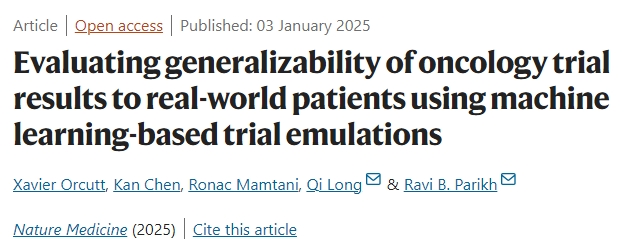Jasmin Hundal, Hematology-Oncology Fellow at Cleveland Clinic and also a Resident Physician at the University of Connecticut, shared a recent article by Xavier Orcutt on LinkedIn:
“Bridging the Gap Between Clinical Trials and Real-World Patients in Oncology.
Clinical trials are essential for advancing oncology treatments, but their results often lack generalizability to real-world patients.
This disconnect can lead to disparities in treatment outcomes and underrepresentation of patients with higher prognostic risk.
A recent study by Xavier Orcutt et al., published in Nature Medicine, introduces Trial Translator, a machine learning-based framework designed to emulate oncology trials and evaluate their applicability across diverse patient populations.
Key Findings:
- Patients with low- and medium-risk profiles experienced survival benefits similar to those reported in randomized controlled trials.
- High-risk patients (greater comorbidities or poorer prognoses) showed significantly lower survival and reduced benefit from standard therapies.
- Trial Translator successfully identified prognostic phenotypes that better reflect the heterogeneity of real-world patients.
Why Does This Matter?
- Restrictive eligibility criteria alone do not explain the generalizability gap.
- Prognostic risk, socioeconomic factors, and selection biases influence trial outcomes.
This study integrates real-world data from Flatiron Health with ML-driven phenotyping to highlight the importance of designing trials that more accurately reflect patient diversity
Implications for Oncology:
- Trial design: Risk stratification can improve inclusivity in future RCTs.
- Clinical practice: Oncologists can use tools like Trial Translator to estimate the real-world benefits of therapies for their patients.
- Regulatory frameworks: Encouraging broader eligibility and pragmatic trials can enhance equitable access to novel therapies
This paper represents a step forward in aligning clinical research with real-world practice to ensure more personalized and effective cancer care.
How can we further address this disconnect in clinical research?”
Authors: Xavier Orcutt, Kan Chen, Ronac Mamtani, Qi Long and Ravi B. Parikh

Jasmin Hundal is a Hematology Oncology Fellow at Cleveland Clinic and a board-certified internal medicine physician. She is also a Resident Physician at the University of Connecticut. Her research centers on the impact of modifiable risk factors like diet, metabolism, and the microbiome on cancer and its treatment.
More posts featuring Jasmin Hundal.


